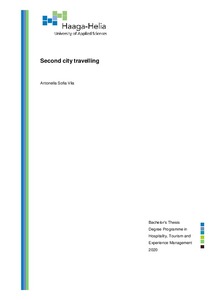Second City Travelling
Vila, Antonella Sofia (2020)
Vila, Antonella Sofia
2020
All rights reserved. This publication is copyrighted. You may download, display and print it for Your own personal use. Commercial use is prohibited.
Julkaisun pysyvä osoite on
https://urn.fi/URN:NBN:fi:amk-2020120426276
https://urn.fi/URN:NBN:fi:amk-2020120426276
Tiivistelmä
The consumption of tourism as a leisure activity has increased dramatically in the past 70 years. As a consequence, both the tourism industry and tourist destinations suffer from environmental impact issues of over-tourism. In recent years, tourism-related businesses have tried to develop solutions to these problems. The second city travelling trend could be a future solution to the problem of over-tourism.
The objective of this thesis is to discover if second city travelling will prevail in the near fu-ture. It also concentrates on finding out how much travellers know about the concept, whether they consider the positive and negative impact they can have when choosing a destination and if they are willing to take a second city travel approach in the future.
The theoretical framework of this thesis consists of the definition of second city travelling, the possible origin of the concept, and the current state of the tourism industry. Moreover, it covers the impact of second city travelling, as well as the advantages and disadvantages of this travel trend in particular. The research was conducted with a quantitative research method, a questionnaire survey.
Based on the results of the research, second city travelling as a concept is still quite unfa-miliar, but the majority of people believe that they might have done it in the past without knowing. The author has categorised travellers' motives into two different groups, altruistic reasons and egoistic reasons. The main finding in this thesis was that travellers would be more likely to consider taking a second city travel approach for egoistic reasons rather than altruistic ones. The results give a thorough overview on the thoughts of travellers regarding the concept of second city travelling.
This thesis was written in November 2020.
The objective of this thesis is to discover if second city travelling will prevail in the near fu-ture. It also concentrates on finding out how much travellers know about the concept, whether they consider the positive and negative impact they can have when choosing a destination and if they are willing to take a second city travel approach in the future.
The theoretical framework of this thesis consists of the definition of second city travelling, the possible origin of the concept, and the current state of the tourism industry. Moreover, it covers the impact of second city travelling, as well as the advantages and disadvantages of this travel trend in particular. The research was conducted with a quantitative research method, a questionnaire survey.
Based on the results of the research, second city travelling as a concept is still quite unfa-miliar, but the majority of people believe that they might have done it in the past without knowing. The author has categorised travellers' motives into two different groups, altruistic reasons and egoistic reasons. The main finding in this thesis was that travellers would be more likely to consider taking a second city travel approach for egoistic reasons rather than altruistic ones. The results give a thorough overview on the thoughts of travellers regarding the concept of second city travelling.
This thesis was written in November 2020.
